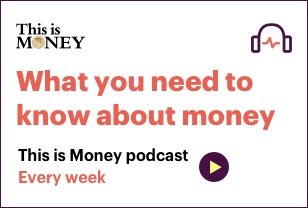Four in five households can now get high-speed gigabit broadband… but do they need it?
Lightning-fast gigabit broadband is now available in 24 million UK households, representing four in five households.
Gigabit broadband can reach download speeds of 1 gigabit per second, or 1,000 megabytes.
Now regulator Ofcom has confirmed that broadband is available to 80 percent of British households, up from 73 percent a year ago.
The reason is that Openreach has increased the number of homes with access to gigabit broadband to 14 million.
Speed, at a price: Gigabit broadband offers extremely fast internet, but at a high price
Openreach is owned by BT and provides the broadband available from companies such as BT, EE, Plusnet, Sky, TalkTalk and Vodafone.
Virgin Media runs a separate network, with all homes it connects to also having access to gigabit broadband packages.
But gigabit broadband remains unpopular, with an average broadband speed of just 69.4 megabytes per second, or Mbps.
Which? director of policy and advocacy Rocio Concha said: ‘A fast and reliable internet connection is essential to modern life and while it is positive that gigabit-capable broadband infrastructure has made progress, more needs to be done to improve uptake among households.
“Consumers need better information, clearer and more consistent terms describing these services, and targeted voucher and discount programs.
‘The Government and Ofcom also still need to consider gigabit capacity for more rural areas, so that no part of the country is left behind.’
So what are the pros of gigabit broadband, what are the cons – and who really needs internet that fast?
The benefits of gigabit broadband
Speed
The main benefit of gigabit broadband is obvious: its incredible speed.
Many households won’t need gigabit-fast broadband, but it can also be useful in many living situations.
This includes large households, households that work with large digital files, or homes where there is a lot of gaming and streaming.
Reliability
Gigabit internet works on physical wires, fiber optic or coaxial cables. This makes the gigabit service very reliable when it comes to patchy connection or outages.
The disadvantages of gigabit broadband
Cost
Gigabit broadband is expensive compared to traditional broadband.
The cheapest deals depend on several factors, including where you live and what you can negotiate from your potential provider.
The cheapest deal found by This is Money costs £40 per month, from Fibrely, but a more typical price is between £50 and £80 per month.
Standard fiber broadband normally costs between £15 and £30 per month, so is significantly cheaper, but at much slower speeds.

How many? Signing up for gigabit broadband can cost up to £80 per month
And like most broadband packages, the cost of gigabit broadband will almost certainly rise every year in line with inflation.
This year, broadband customers saw inflation-related internet price increases of up to 7.9 percent.
Ofcom plans to ban broadband price increases in the medium term, but this won’t happen until this summer at the earliest.
If the regulator takes action, the upfront costs of all broadband, including gigabit, could rise to offset the loss of revenue for providers.
Overdone
Many homes simply don’t need internet as fast as gigabit can provide. Browsing the web, streaming and even gaming can be done effectively enough for most people on much slower connections.
It may not be available
Ofcom figures show that 20 percent of households cannot get gigabit broadband even if they want to because they do not live in parts of the country where it has been rolled out.
Broadband pricing pitfalls to be aware of
When considering a broadband package, it is also wise to look beyond the initially advertised monthly price.
This is because broadband companies know that households and price comparison websites rank deals based on monthly costs.
This has led to the growth in the number of introductory offers and start-up fees, which muddies the waters when trying to figure out what a deal really costs.
For example, some deals advertise a low rate, but this only applies to the first few months. After that, a higher rate applies for the rest of the deal.
Another thing to watch out for is the start-up costs. As the name suggests, this is a one-off charge paid at the start of a new broadband deal, and normally amounts to around £10.
You may also have to pay an exit fee if you leave your existing provider before the fixed-term contract expires.
Some links in this article may be affiliate links. If you click on it, we may earn a small commission. That helps us fund This Is Money and keep it free to use. We do not write articles to promote products. We do not allow a commercial relationship to compromise our editorial independence.

